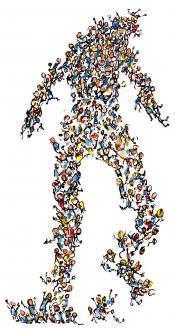Societal Debates About Emerging Genetic Technologies: Toward a Science of Public Engagement
By Christopher D. Wirz,
Environmental Communication
| 09. 29. 2020
Gene editing is an inherently wicked problem
Societal debates about the applications of novel gene editing techniques like CRISPR in agriculture, wildlife, and humans have only rarely focused on questions that have correct or even factual answers. Of course, many discussions within the bench scientific community are focused on technical risks and benefits and the weighing of the latter against the former in the desire to develop climate- or pest-resistant crops (National Academies of Sciences, 2016) or therapies for devastating genetically-inherited diseases in humans (National Academy of Sciences & National Academy of Medicine, 2017).
While public debates are ideally informed by these scientific considerations, they are – by nature – much broader in scope. Gene drives developed to limit the spread of vector-borne illness carried by mosquitos, for instance, have raised concerns about the morality of “messing with nature” by editing the genome of living organisms for dominant traits, about creating imbalances in already fragile ecosystems, and about unintended and potentially irreversible long-term consequences for humans and nature (Brossard et al., 2019). At the same time, pesticides...
Related Articles
By David Jensen, California Stem Cell Report | 02.10.2026
Touchy issues involving accusations that California’s $12 billion gene and stem cell research agency is pushing aside “good science” in favor of new priorities and preferences will be aired again in late March at a public meeting in Sacramento.
The...
By Alex Polyakov, The Conversation | 02.09.2026
Prospective parents are being marketed genetic tests that claim to predict which IVF embryo will grow into the tallest, smartest or healthiest child.
But these tests cannot deliver what they promise. The benefits are likely minimal, while the risks to...
By Mike McIntire, The New York Times | 01.24.2026
Genetic researchers were seeking children for an ambitious, federally funded project to track brain development — a study that they told families could yield invaluable discoveries about DNA’s impact on behavior and disease.
They also promised that the children’s sensitive...
By Arthur Lazarus, MedPage Today | 01.23.2026
A growing body of contemporary research and reporting exposes how old ideas can find new life when repurposed within modern systems of medicine, technology, and public policy. Over the last decade, several trends have converged:
- The rise of polygenic scoring...




